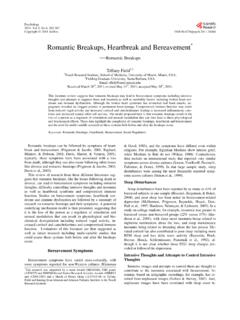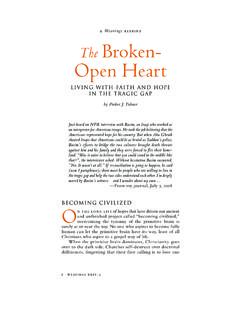Transcription of FROM HEARTBREAK HEALING - Public Welfare
1 NEXTHEARTBREAKFROMTOThe Journey of Crime SurvivorsHEALINGP ublic Welfare FoundationFrom HEARTBREAK to HEALING the Journey of Crime Survivors | 2 PREVIOUS | NEXTI ncreasingly, victims of crime and their surviving family members are speaking out for reconciliation, rather than retribution, in the debate over criminal justice reform. Public Welfare FoundationFrom HEARTBREAK to HEALING the Journey of Crime Survivors | 3 PREVIOUS | NEXTAs Robert Rooks, the organizing director of CSJ and vice president of the Alliance for Safety and Justice (ASJ), another Foundation grantee, put it, You have mothers who have a son in the grave and a son in , realizing that connection means that we can talk about crime victimization and also talk about reducing numbers of people in prison in the same conversation about community safety.
2 When the conference started five years ago, there were barely enough people to fill a hotel room, according to one observer. This year, the participants filled an auditorium-sized room at the Convention Center, were addressed in person by California Governor Jerry Brown, and ended the meeting with a spirited march and rally in front of the State Capitol building. They were seeking not only more services to help them heal, but more resources for the violence-plagued communities that have been hit hardest by crime and incarceration. Advocacy on behalf of crime victims gained prominence in the 1980s, resulting in victims bills of rights in a majority of states. These laws often guarantee victims the right to speak out at certain proceedings, such as sentencing and parole hearings. The federal Victims of Crime Act of 1984 (VOCA) and similar state laws provide funding for victims services, including mental health counseling and compensation for financial losses.
3 Still, most victims do not benefit, since fewer than half of all crimes are reported to the police. Despite well-intentioned efforts, the views of the overwhelming majority of victims and survivors including those who survived a crime as well as those who have lost family members and other loved ones to crime have not been represented in state capitals or Public policy debates. A recent, first-of-its-kind survey of crime survivors conducted by ASJ finds that young, low-income people of color are disproportionately represented among victims and that most crime survivors receive no help from the criminal justice system after the incident. The survey results also show widespread dissatisfaction with policies and practices that result in long prison sentences for offenders. Crime survivors, such as those who attended the conference, want less spending on prisons and jails and more on education, job creation programs, and mental health treatment.
4 For Aswad Thomas, National Organizer for ASJ, the survey underscores a reality gap. Across America, too many victims experience crime repeatedly, with little support from the criminal justice system, he noted. Crime survivors and the communities most harmed by crime and violence need investments in trauma recovery, mental health and drug treatment services, and not more incarceration. As Danielle Sered, director of Foundation grantee Common Justice, also explained: When we listen to survivors, we hear a desire for accountability, but not necessarily in the form of punishment. There should be an answer for what s been done. The crime shouldn t go unaddressed, unanswered or In April, about 500 people gathered at the Convention Center in downtown Sacramento, California for the annual Survivors Speak Conference.
5 The conference, organized by Californians for Safety and Justice (CSJ), a Public Welfare Foundation grantee, has become an important measure of the increasing recognition that crime survivors should be included in discussions about criminal justice reform and that, very often, perpetrators, victims and survivors come from the same communities, and even the same families. Public Welfare FoundationFrom HEARTBREAK to HEALING the Journey of Crime Survivors | 4 PREVIOUS | NEXTAt the fifth annual Survivors Speak conference in Sacramento, California, about 500 victims of crime and surviving family members of crime victims came together to try to heal and learn to deal with trauma; to hear from Crime Survivors for Safety and Justice leaders, such as Sujatha Baliga (top left), a restorative justice expert; to help each other tell their own stories and to find common ground; to remember loved ones and offer support at a candlelight vigil; and to rally at the State Capitol building, releasing balloons for HEALING and seeking more resources and services for victims and survivors.
6 Public Welfare FoundationFrom HEARTBREAK to HEALING the Journey of Crime Survivors | 5 PREVIOUS | there is a nuance among survivors. They understand the difference between [whether] someone should be held accountable and whether somebody should go to prison. Those are two different questions and [survivors] might give two different , survivors want things for themselves. They want the things that will help them heal, that will help them get peace. And they suffer in a system that is myopically focused on punishment, often at the expense of meeting their needs. They are upset that we spend so much money punishing the people who commit crimes, instead of helping the people who are hurt. Elevating the voices of crime survivors, particularly those from more diverse racial and socio-economic backgrounds, has been part of anti- death penalty efforts for decades, recalled Shari Silberstein, executive director of Equal Justice USA and a former Foundation grantee.
7 The movement has also shifted toward a more thoughtful model of restoration and rehabilitation for survivors and their communities. In 2011, Partnership for Safety and Justice, a Foundation grantee based in Portland, Oregon, released a report called Beyond Sides, which called for more collaboration between groups working on a criminal justice reform agenda and victims who share some of their critiques. With the help of ASJ, a multi-state advocacy campaign to reduce prison populations in high incarceration states, other Foundation grantees including Colorado Criminal Justice Reform Coalition, Texas Criminal Justice Coalition and Citizens Alliance on Prisons and Public Spending (CAPPS) in Michigan will incorporate the perspective of survivors to achieve the overall goals of sentencing reform and reducing mass incarceration.
8 In addition, increases in VOCA funding present a historic opportunity to invest in community-based programs in underserved communities. And there is more money than ever before to provide direct services to help victims of crime recover from trauma. In the current fiscal year, VOCA funding totaled $ billion, up from $745 million the previous year. Ultimately, many survivors and other criminal justice reformers want a new model of criminal justice that recognizes the trauma suffered by many communities. According to Silberstein of Equal Justice USA: We believe the justice system needs to serve all the constituencies impacted by crime: survivors, those who commit crimes, and communities. That means providing HEALING for survivors, accountability for those who commit crimes, and safety for communities. Right now, the primary focus is prison as a false solution to meeting all those needs.
9 But [we want] more of an ecosystem that takes a holistic view. Crime survivors should have robust, accessible, culturally appropriate services and care that are available on demand to anybody who s been harmed at any point in time. Accountability should be rooted in more restorative practices that provide opportunities to repair the harm and work toward personal HEALING and reconnection to the community. And communities need more of a Public health model for dealing with violence, one that includes HEALING , addressing trauma, and understanding violence as a disease that can spread, so you try to contain it and then eradicate it. And we know how to do all of this. There are amazing programs all around the country that do some pieces of all these things. But those are not the core of our justice system, they are the exceptions and we need to make them the norm.
10 Here are the voices and the stories of a few of the crime survivors who attended the WilsonLynn WestryAdela BarajasAswad ThomasPublic Welfare FoundationFrom HEARTBREAK to HEALING the Journey of Crime Survivors | 6 PREVIOUS | NEXTWILSONDIONNEP ublic Welfare FoundationFrom HEARTBREAK to HEALING the Journey of Crime Survivors | 7 PREVIOUS | NEXTDan was working a night shift alone and responded to a complaint about a group of four young Latino men who were drinking and talking loudly outside an apartment complex. While Dan checked their identifications, one young man, fearful that a couple of guns and a pocketful of drugs might be discovered in a search, emptied one of the guns into the officer. People are killed every day and [survivors] are left, literally, to fend for themselves and pick up the pieces of their lives and try to go on, especially if the crime doesn t have a suspect.









